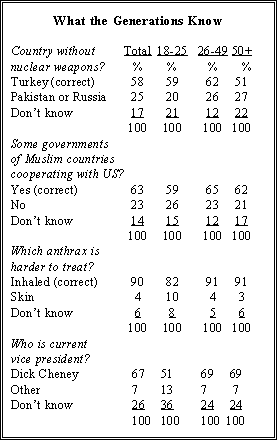
The post-9/11 era has seen a sharp rise in the public’s appetite for serious news. Even a majority of young people, who traditionally lag well behind their elders in news attentiveness and knowledge, have stayed on top of terrorism-related developments. That has raised hopes that young people will now become more avid consumers of all news and, as a result, better informed and more engaged citizens.
That may yet occur, but so far young people have focused intensely on Topic A while showing no more than modest interest in other subjects. As a result, twenty-somethings are remarkably well-briefed on terrorism and even the geopolitics of central Asia, even as they continue to have a poor grasp of politics in this country.
What the Generations Know
In a November survey by the Pew Research Center*, 59% of the 25-and-under group correctly identified Turkey (from a list that also included Pakistan and Russia) as a nation that does not possess nuclear weapons. Older Americans were no better informed on this point. And young people’s awareness of facts relating to anthrax and Muslim support for the war was on par with their elders.
When it comes to elementary political facts, however, many young Americans are still in the dark. Only about half (51%) could identify Dick Cheney as the vice president of the United States. That is not only less than any other age group, it is well below the 64% of 25-and-unders who correctly identified Al Gore as vice president in a 1994 survey.
Indeed, politics remains a turnoff for most young people in the post-9/11 era. Just 45% expressed interest in local politics, the lowest of any age group. Although an increasing number of young people said they were more interested in Washington news since the attacks, all age groups report heightened attention to Washington developments, largely because of the attacks and the war.
While most young people say their overall news interest has increased because of the attacks, there is a considerable generation gap in attentiveness to non-terrorism news. For example, fewer than three-in-ten young people reported paying close attention to economic news, compared with better than four-in-ten of the rest of the public.
As the nation gets back to normal following the attacks, and reports on terrorism become somewhat less urgent, young people may well revert to their pre-Sept. 11 habits of clicking past newscasts and avoiding newspapers. That has implications beyond the universe of media executives, who desperately covet the “youth demographic.”As interest in public affairs among young people has declined over the past three decades, so too has their civic participation. Barring a stunning shift between now and November, fewer than one-in-five of those under age 25 will cast ballots in the mid-term elections, the lowest rate of any age group.
* Conducted with the Center for Information & Research on Civic Learning & Engagement (CIRCLE).




